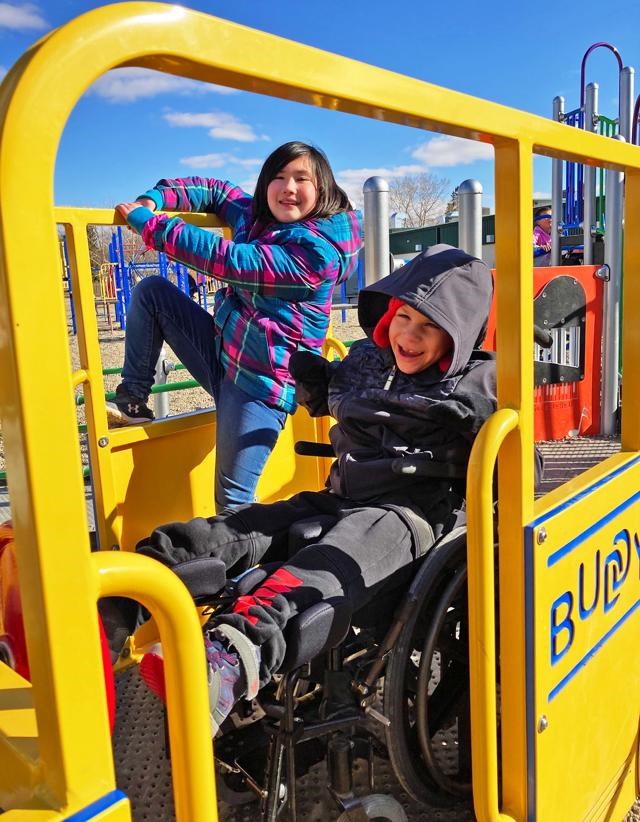The first phase of the new inclusive playground equipment project at St. Michael School is finished, and project organizers are now considering moving on to the second and third phases, Holy Family board members heard in an update at the November board meeting on Wednesday.
St. Michael principal Dean Loberg and project coordinator Deanna Schwindt provided the update, noting the first phase was the biggest part of the project.
“We’ve got a great team at St. Mike’s. They’re all very very supportive,” said Schwindt. “It’s very exciting for us. It’s been a couple years in the making.”
The playground equipment was put in early October with the help of many volunteers. Loberg noted the last part of the equipment for the first phase just arrived that day, a second slide to be added on.
Schwindt explained the first phase cost $72,000, which was all paid for through fundraising, donations by many groups and companies, and grants, including funds provided by the Holy Family School Division.
“Without your support, this wouldn’t have happened,” Schwindt told the board, noting over half of the funds for the first phase came from Holy Family.
There were fundraising projects by many groups, including by the Lions Club, and a Grade 8 class at St. Michael which held a dance and bake sale among other activities.
Volunteer labour was also provided for the installation by the Knights of Columbus and Young Fellows Club.
Schwindt also shared the story of two students at St. Michael, one of whom, Max, is in a wheelchair and had been unable to play on the playground with his classmates until this new equipment was installed.
“The day we were setting it up, one of Max’s friends asked, ‘does this mean we get to play with Max now?’,” said Schwindt. “It’s not just about Max, it’s about the whole of society, that principle of having everybody included. It’s teaching our students to be inclusive of everybody around them.”
She added that seeing the students’ reaction to the project showed her that the students are getting the points about inclusiveness and accessability.
Some funds came from two students who are part of the “100 Kids Who Care” about Weyburn charitable group, where they presented the project to be voted on to receive some of the funds they collected.
The second phase is two pieces of equipment that cost $15,000, and the third phase is paving the whole area with rubber, which would further enhance accessability for students who have mobility issues. This phase will cost $64,696 for the paved rubber.
The project organizers have been applying for grants, such as to JumpStart, and to KalTire towards the use of recycled tires for the paved rubber part.
“I’m hoping with this we can at least get the paved rubber portion,” said Schwindt.
“It’s a tough year for fundraising,” said Loberg, noting any fundraising activity they do have has to be done “in a COVID-friendly fashion.”
He pointed out the school is making posts on social media to celebrate the many businesses and groups that helped provide labour or funds for the first phase of the project.
He also noted that the installation was done during the school week, so many students took time to watch the volunteers work, and it boosted the volunteers’ morale to hear and see the excitement of the kids about the new equipment.
“You were relentless about getting this done. It must be gratifying to watch what happened with the children,” said education director Gwen Keith to Schwindt.
“When I called and said we were $7,000 away from getting enough, the board approved it,” said Schwindt. “Having it done is very rewarding, and this thanks is from all the people who are benefitting from it. It’s not just me, it’s the entire team.”



